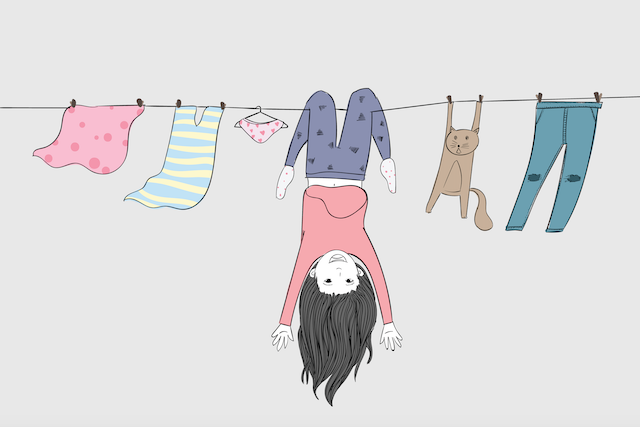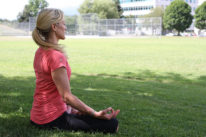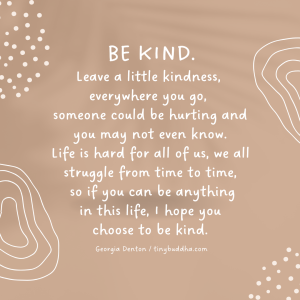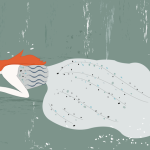
“Smile, breathe and go slowly.” ~Thich Nhat Hanh
Last night I did something I rarely do. Drum roll please…
…last night I cooked.
Okay, to be fair, I more prepped than cooked. But my willingness to participate in this domestic ritual, with my boyfriend at the helm, was certainly not the norm. Neurotic as I may be with organizing and cleaning, cooking has never been my thing.
For starters, I’m cheap with food. I’d rather spend money on books and pedicures than saffron and truffles. I realize I could channel my inner Rachael Ray and learn to make budget-friendly meals, but an even easier approach is to make full use of my Subway rewards card.
It’s not just my aversion to spending on consumables that attracts me to cheap take-out and cereal. It’s also a matter of priorities.
I look at the day as blocks of time—much like Hugh Grant in About a Boy. Left to my own devices, I fill those blocks with tried-and-tested activities, like writing, reading, watching movies, and practicing yoga. Suffice it to say, cooking isn’t on my list.
I know I enjoy my world better when I make little changes to my routine—when I take alternative routes to familiar places or make spontaneous plans with old friends, for example. But sometimes I need reminders to do things differently.
Tonight’s reminder brought me to the cutting board, and I must admit I enjoyed it far more than I would have imagined.
As I cut onions and tomatoes into perfect little cubes for pico de gallo, humming and falling into a staccato rhythm, I remembered something my dad said the day prior. He asked me to leave the dishes for him because he’d come to enjoy washing them since losing his job.
He didn’t have the words to explain his new-found fondness for Palmolive, but he didn’t really have to expand. I knew exactly what he meant: Simple household rituals can be calming and even gratifying when you throw yourself into them completely.
After an hour of cutting—my boyfriend planned an ambitious Mexican meal for my family, who we’re visiting—I felt almost as relaxed as I do after yoga. Okay, so the mid-prep margarita may have contributed to my mellow state, but I’m convinced the chopping had a lot to do with it.
I’ve decided to get more deliberate with my household tasks; to actually schedule them, instead of squeezing them between things I want or need to do. Mindfully completing a simple household task can be like skipping a pebble on a pond, sending ripples of Zen into the day.
If you’re also interested in forming a mindfulness practice in your home, I recommend the following:
1. Let your bed set the tone for the day.
Making the bed is sort of a no-brainer for me. Leaving it unmade feels as unnatural as leaving my house without pants. However, I know it can be tempting to leave the sheets and blankets crumpled to jump into the day a few moments sooner.
Deliberately making your bed in the morning sets the pace for the day. It says you’ll take your time transitioning from one activity to the next without scrambling or rushing just to get things done. Because really, when you’re moving that fast, how much of your day do you fully experience and enjoy?
2. Wash the dishes slowly.
As my father knows, doing the dishes can be both satisfying and grounding. Feel the warm water on your hands; let yourself enjoy the experience of making something dirty clean again. Don’t think about finishing or what you’ll do when you’re finished. Focus solely on the doing.
Thich Nhat Hanh explained it well in his book The Miracle of Mindfulness:
“To my mind, the idea that doing dishes is unpleasant can occur only when you aren’t doing them…I enjoy taking my time with each dish, being fully aware of the dish, the water, and each movement of my hands. I know that if I hurry in order to eat dessert sooner, the time of washing dishes will be unpleasant and not worth living. That would be a pity, for each minute, each second of life is a miracle.”
3. Use cleaning as an exercise in acceptance.
How often in life do we fight ourselves on things we don’t want to do? We procrastinate, we complain, we outsource—a viable option if you can swing it. For the most part, though, we’d benefit from accepting that we have to do things we don’t like on occasion, and then doing them instead of using energy to avoid them.
Cleaning the toilet is right up there with root canals on my fun list, but it won’t clean itself. In accepting this and then doing it—when it needs to be done and no later—I prepare myself to carry this same acceptance outside my house. To stop judging things as good and bad to soften the nagging inner monologue that keeps me divorced from the present.
4. Let your senses take over in the shower.
You’ve probably experienced a meditative shower at least a few times in your life. It’s easy to let go of all other thoughts when you’re standing under a stream of water, set to the perfect temperature for you.
Take this time to tune into your senses. Choose a soap you love so that the scent is intoxicating. Enjoy the sensation of the water on your skin and feel it drip down your back, your calves, and your heels. My favorite part is when the water first hits my head. It reminds me of getting my hair washed at the salon—a perfect massage as the stylist kneads my head beneath the firm water pressure.
A meditative morning ritual takes you into the day with a clear, focused mind.
5. Turn a boring activity into the noticing game.
“The noticing game” is not a technical term; I’m sure a monk has described this same idea much more eloquently, but humor me if you will.
Here is an example of the noticing game in action: On my flight from California to Massachusetts last month, I encountered the perfect storm of difficult plane circumstances. I felt wired and couldn’t sleep, my TV was broken, and I couldn’t turn on my light to read lest I wake up the baby right next to me.
There was nothing to do to pass the time. I was tempted to break my first rule of flying home and pull out the credit card for an overpriced in-flight drink. Instead, I decided to notice everything in my environment.
I people-watched, identified interesting items of clothing, paid attention to things I heard, and noticed the different smells around me (luckily, not coming from the baby). This allowed me to sink into the present moment instead of searching for ways to avoid it.
You can do the same thing when vacuuming, dusting, or ironing. Notice things about your furniture you may not have seen before—textures, colors, or shapes. Notice patterns on your clothes.
When you focus on being in your environment, it’s easier to appreciate the moment for what it is instead of wishing you were somewhere else.
I don’t know about you, but that’s one skill I’ve yet to master. I work on it, one shower, one dish, one tomato at a time. And in doing, I am happy.
About Lori Deschene
Lori Deschene is the founder of Tiny Buddha. She started the site after struggling with depression, bulimia, c-PTSD, and toxic shame so she could recycle her former pain into something useful and inspire others to do the same. You can find her books, including Tiny Buddha’s Gratitude Journal and Tiny Buddha’s Worry Journal, here and learn more about her eCourse, Recreate Your Life Story, if you’re ready to transform your life and become the person you want to be.
- Web |
- More Posts













 Though I run this site, it is not mine. It's ours. It's not about me. It's about us. Your stories and your wisdom are just as meaningful as mine.
Though I run this site, it is not mine. It's ours. It's not about me. It's about us. Your stories and your wisdom are just as meaningful as mine. 